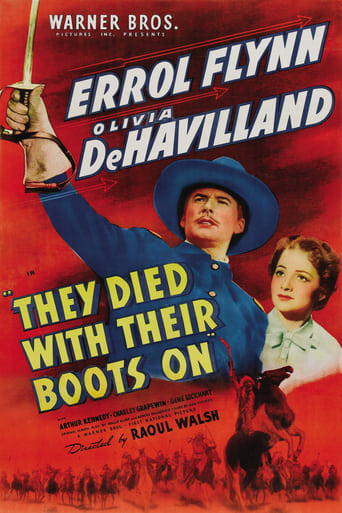John austin
The historical aspects may be a little off, but Errol Flynn was a great choice to play George Armstrong Custer in this Warner Bros. classic.It's a western that almost approaches an epic scale with battle scenes ranging from the Civil War to the Indian Wars in the west years later. Flynn is again perfectly teamed with Olivia DeHavilland along with a great supporting cast that includes Sidney Greenstreet and Anthony Quinn as Crazy Horse.Contrary to a lot of people's understanding of the mindset of that era, this film gave great respect to the Indian tribes and in no way casts them as the villains. Nor were they really cast as victims either, as they controlled the battlefield at the end. Despite the historical lapses, there's no Hollywood ending for the 7th Cavalry in this one, folks.This film was a huge hit for Warner Brothers, and it stands up as one of Errol Flynn's greatest.
thirdsqurl
Movie makers in 1941 were not interested in giving history lessons, they wanted good characters and lots of action, and this movie delivers both. Errol Flynn was already a well-established swashbuckler when he made this film for Warner Brothers, the last of eight he made with co-star Olivia de Havilland. Custer's comical arrival at West Point is designed for humor, and his record is still an example of what not to do, but no one ever accused Custer of being stupid. He was undisciplined, a prankster, and inattentive to duty, but whenever he came close to being dismissed from the academy, he would straighten up and have a perfect record the rest of the year. He was also one of the academy's most popular cadets, which the movie does a good job of showing. The movie also shows Custer's aggressiveness and success during the Civil War, where he was rightly considered a national hero at age 23. Unlike most generals, Custer did not lead his men from a headquarters, he rode at the front and shared the dangers with his men, who had universal respect for him. It was not until Custer went west, forced to command troops that refused to obey orders and often deserted, that his reputation suffered, and the movie also reflects this transition though in a fictional manner. The Little Big Horn battle is exciting from a movie point of view but is wildly fictional. None of the complexities, tactics or conflicting personalities that guided the battle are dealt with in the movie. What They Died With Their Boots On does best is show Custer's charismatic personality, which Flynn is perfect for. In his lifetime, Custer was considered a generous, honorable and courageous man. Yes, he could be cantankerous and had an ego (so did General George Patton and General Douglas McArthur), but the vision of him as an Indian-hating egomaniac is really a process of 1960s political revisionism, usually propagated by those who get their history lessons from bad television shows. Custer was an officer of the United States Army, and when he went into the field, it was on the orders of U.S. Government, not because he decided to go out and attack Indians. Errol Flynn does a wonderful job of showing Custer from several different viewpoints: glory seeking soldier, loving husband, loyal friend, and a man with a conscience. What this movie lacks in historical accuracy is made up for by capturing the spirit of its characters.
denis888
Well, well, such grand black and white 2-hour long movies could only appear in the 30-50'. Now, it will be virtually impossible to imagine such a crazy medley of motley genres and often unimaginably incoherent episodes. This head-cutting array of pure comedy, farce, tragedy, love story, drama, war film, and who-knows-what-not is sometimes puzzling and dazzling. Errol Flynne is excellent here, he was made right for this movie, with his arrogant air, big grin, flashy style, wild morale, unhinged behavior and tear-jerking sentimentality. Generally, the film is Not the accurate history document, as sometimes it borders on the brink of purely slapstick comedy of The Marx Bothers. The Civil War here is at least sketchy and jotted, the whole post-war period is at best blurred and slurred. The heroic demise? Custer's Last Stand? Well, typical sped-up cavalry run, chaotic battle, unrealistic deaths and falling. The Indians are pure barbarians here, only great mighty Anthony Quinn is a great Must See. generally, strange and not tragic death scene. It goes, and yes, it goes. That is all. The conclusion? Nice. Not perfect
Naileddown2
Very good movie. Not sure if the humor is part of the construction to defer from the historical inaccuracies but excellent none the less. DeHaviiland and Flynn got along very well I suspect from there on screen ease of relating and comic timing. The Negro maid is very good also and of course Greenstreet with the funny laugh. Th film has a contemporary feel with its offhanded, dis-organized script structure(for the time) and slapstick relief throughout. Why is it that Anthony Quinn doesn't seem to look much different even 20 years later. It is interesting that Flynn got away with his strange mix of accents which may have formed part of his attraction and point of difference from other actors at the time.



